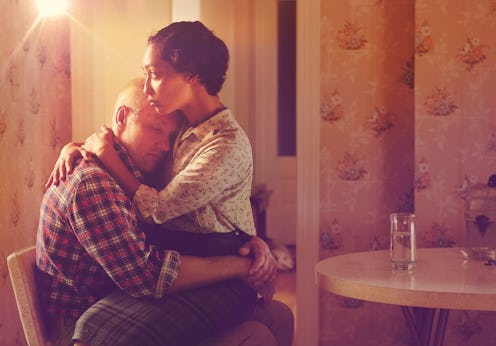
You know when you read the plot synopsis of a movie and instantly have psychic visions of it winning tons of Oscars? That's what I experienced when I first heard about Loving, opening in theaters Nov. 4. The romantic drama stars Preacher's Ruth Negga and The Great Gatsby's Joel Edgerton as Mildred and Richard Loving, an interracial couple whose marriage is prohibited by law in the era when the film is set. They challenge the racist law of the state of Virginia, and their tenacity and love for one another sets off a chain of events that makes history. This is powerful subject matter, and all the more important because Loving is based on a true story. Even the couple's last name — which seems too symbolic to be true — hasn't been changed.
The Wrap reported during production that the HBO documentary The Loving Story inspired this dramatic take on the landmark case. It premiered on Valentine's Day 2012 and won a Peabody Award and Emmy for Outstanding Historical Programming. The Loving Story has been adapted into Loving by writer/director Jeff Nichols, the filmmaker behind Mud and Midnight Special.
16 states in the U.S. were still bound by anti-miscegenation laws in 1967, the year that the Lovings' case against Virginia was decided by the Supreme Court. Anti-miscegenation laws made interracial marriage and even sex between races illegal. Richard Loving was white; his wife Mildred was of African-American and Cherokee descent. They drove to Washington, DC in 1958 to marry, and then came back to their home state to live out their lives together. Instead of humble domestic bliss, the Lovings were met with persecution. According to Mother Jones, their home was raided by police in the middle of the night approximately a month after they'd wed. They were in violation of Virginia's "Racial Integrity Act," signed into law in 1924. That act demanded that individuals be registered as either "white" or "colored" at birth, to prevent future interracial marriages. As a part of his judgment, the Lovings' trial judge delivered this statement to the court:
Almighty God created the races white, black, yellow, malay and red, and he placed them on separate continents. And, but for the interference with his arrangement, there would be no cause for such marriage. The fact that he separated the races shows that he did not intend for the races to mix.
A People profile of the couple states that the Lovings pled guilty and cooperated with the court by leaving the state instead of facing jail time. They were forced to live in D.C. and apart from their families for years. In 1964, Mildred Loving wrote to Attorney General Robert F. Kennedy to see what could be done. He referred her to the American Civil Liberties Union. The Lovings' ACLU lawyers Bernie Cohen and Phil Hirschkop are played by Nick Kroll and Jon Bass in the movie. Undeterred by two appeals, the next stop was the Supreme Court. After hearing the case, the Supreme Court ruled anti-miscegenation laws to be unconstitutional and thus, ordered the Lovings' convictions to be reversed. Chief Justice Earl Warren was not messing around when he delivered the opinion of the court and condemned the racist origins of those laws. Warren said:
There is patently no legitimate overriding purpose independent of invidious racial discrimination which justifies this classification. The fact that Virginia prohibits only interracial marriages involving white persons demonstrates that the racial classifications must stand on their own justification, as measures designed to maintain White Supremacy.
Richard Loving passed away in 1975 in a car accident. Mildred lived until 2008. Their contribution to history and the dismantling of the remnants of Jim Crow is recognized annually on June 12th, aka Loving Day. No matter how it fares during awards season, Loving will increase awareness of their story and the damage caused by institutional racism.
Image: Focus Features